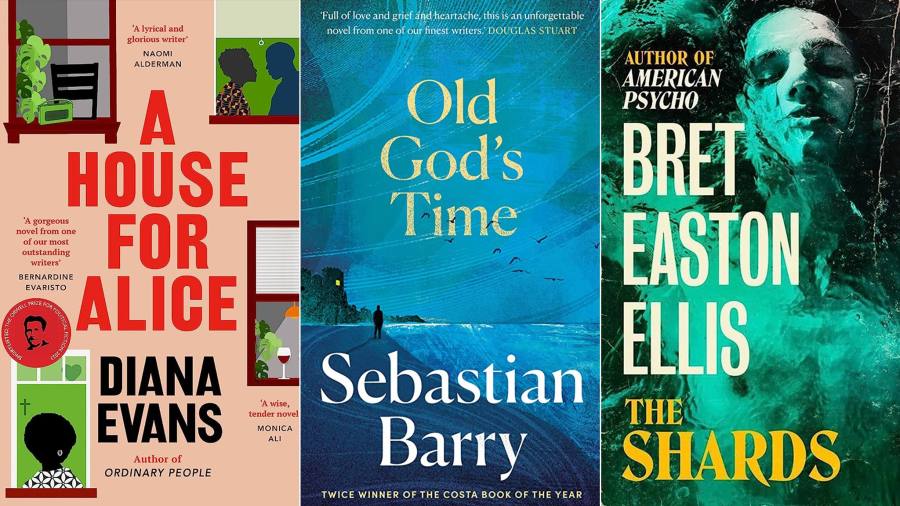Old God’s Time by Sebastian Barry (Faber)
When Tom Kettle, a retired police officer living in a remote annex overlooking the Irish Sea, receives a knock at the door, his tragic past is wrenched back into the present. Barry’s dreamlike narrative, which captures the human inclination towards both beauty and depravity, slowly gathers pace as the book reaches its redemptive finale.

Unfinished Business by Michael Bracewell (White Rabbit)
Martin is a middle-aged, middle-class Londoner who hates his job and spends his evenings drunkenly raking over the embers of his misspent life. Am I selling this hard enough? Slim and deceptively modest in its ambitions, Unfinished Business is one of the most affecting and accomplished novels of 2023.

Birnam Wood by Eleanor Catton (Granta/Farrar, Straus & Giroux)
In 2013, Catton was the youngest ever winner of the Booker Prize with The Luminaries. She returns with a cli-fi novel that follows a band of guerrilla gardeners as they attempt to defend a protected region in New Zealand’s South Island from the designs of a billionaire prospector. A “heart-racing thriller [that] keeps us guessing to the end”, according to the FT’s review.

The Guest by Emma Cline (Chatto & Windus/Random House)
A searing portrayal of the precariat? Or a slick summer thriller? The answer is: both. When Alex is ejected from the Long Island resort where she’s been staying with an older man, she seeks ever more extreme means of clinging on. The wealthy clique depicted in Cline’s unsettling second novel is by turns boorish and menacing — but you won’t be able to look away.

The Shards by Bret Easton Ellis (Swift Press/Knopf)
Ellis fans have had their patience tested in recent years, but The Shards — a semi-autobiographical story of murder and excess in the San Fernando Valley, and the author’s first novel for well over a decade — “takes us back to our discovery of his daring world”, according to the FT’s reviewer.

A House for Alice by Diana Evans (Chatto & Windus/Knopf Doubleday)
Evans has never been one to flinch from social and political realities in her fiction, and her latest novel — an impressive sequel to 2018’s Ordinary People — begins with the horrors of the Grenfell Tower fire. Spinning out from that disaster is the poignant story of Alice, an elderly Londoner who longs to return to Nigeria, and the familial web that surrounds her.

Soldier Sailor by Claire Kilroy (Faber)
Nothing too terrible happens in Kilroy’s brilliant, fictionalised account of new motherhood, but the book, which manages to elevate the everyday to the epic, is so tense you will read bits of it through your fingers. It’s also politically charged and deftly funny.

Biography of X by Catherine Lacey (Granta/Farrar, Straus & Giroux)
This is a meticulously researched biography of an artist who collaborated with David Bowie, partied with Andy Warhol and took New York by storm. It’s also a fake — or, at least, a fiction. Set in an alternative America, Lacey’s novel, which intersperses prose with images, is a dazzling achievement.

August Blue by Deborah Levy (Hamish Hamilton/Farrar, Straus & Giroux)
With its strong female protagonist and uncanny effects, August Blue — featuring a virtuoso pianist named Elsa M Anderson, together with her doppelgänger — has all the hallmarks of a Levy novel. And, once again, the author delivers: a meditation on artistic creativity that is sensual, enigmatic and strangely addictive.

Victory City by Salman Rushdie (Jonathan Cape/Random House)
It’s fitting that Rushdie’s first novel since the attack he suffered last summer (though it was completed before) is not just a glittering fantasy epic — following the fortunes of a 14th-century bard named Pampa Kampana, who sets out to build an empire — but also an impassioned plea for pluralism and a testament to the endurance of words.

The House of Doors by Tan Twan Eng (Canongate/Bloomsbury)
In 1921, the writer William Somerset Maugham made the first of two trips to British Malaya, collecting ideas for short stories as he went. Tan’s third novel adds another layer of fiction to one of those tales, skilfully blending details of a real-life court case with a rich evocation of the colonial society that hosted the author: sepia-tinged but rife with injustice.

The Late Americans by Brandon Taylor (Jonathan Cape/Riverhead Books)
Fresh from the success of his 2020 Booker-shortlisted debut Real Life, Taylor is back with another exquisitely written novel about sex, race and artistic identity. The book’s Wharton-esque title hints at a certain indebtedness to the 19th-century novel, but its depiction of a loose association of students at a Midwestern university is wholly modern.
Laura Battle is the FT’s deputy books editor
Join our online book group on Facebook at FT Books Café
Read the full article here




